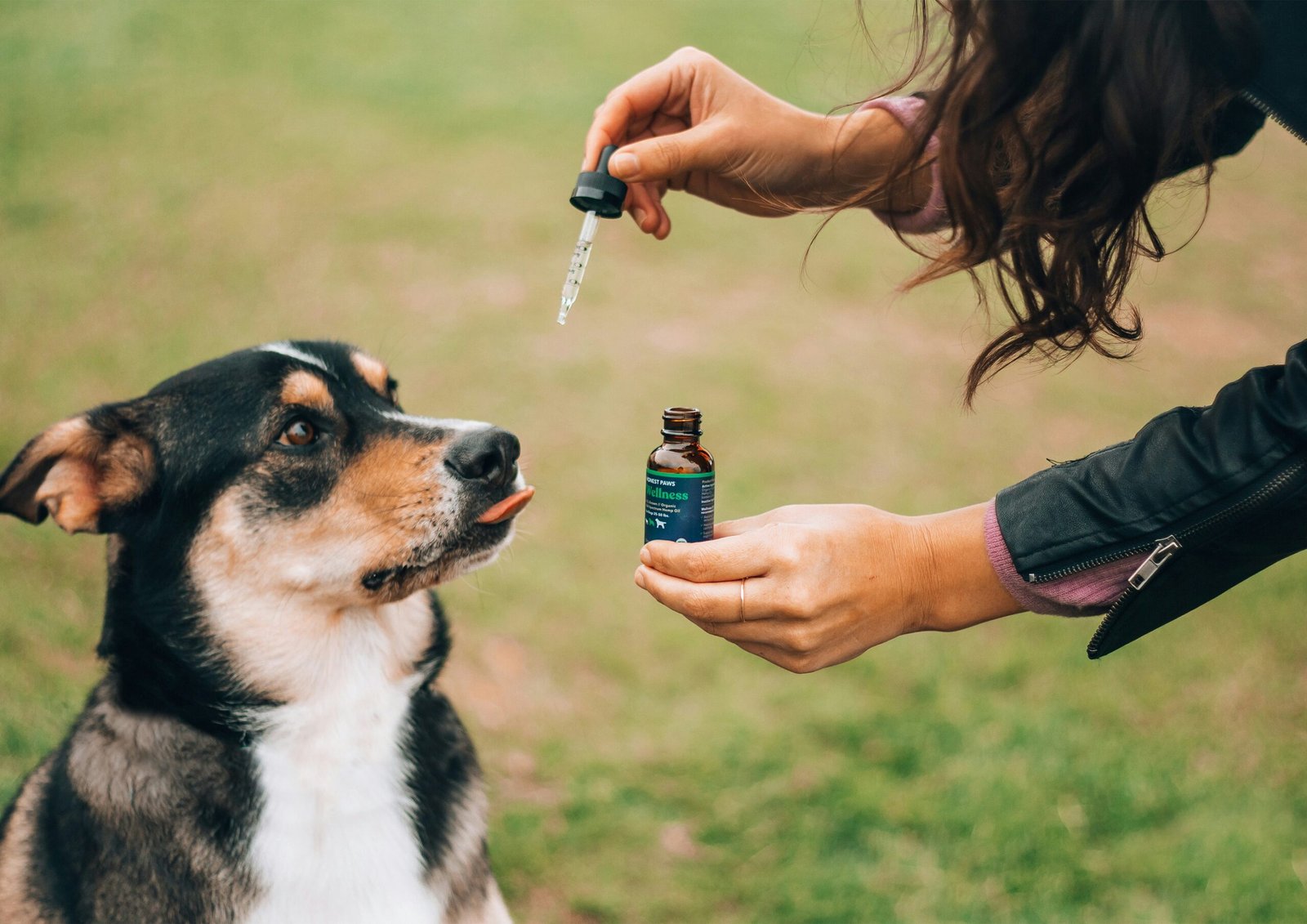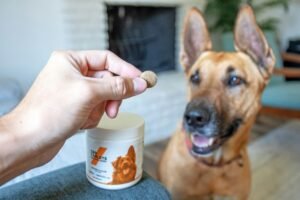Introduction
Knowing how to choose dog supplements in 2025 can feel overwhelming. Every bottle promises healthier joints, better digestion, or more energy—but not all of them are safe or effective.
When my senior Lab, Max, started limping, I learned this the hard way. One “miracle” powder did nothing but drain my wallet. Only later did I discover which supplements actually work and which are just hype.
In this guide, you’ll learn step by step how to choose dog supplements that are safe, effective, and the right fit for your dog’s needs—without wasting money or risking their health.
This post may contain affiliate links. If you buy through these links, I may earn a small commission at no extra cost to you. As an Amazon Associate, I earn from qualifying purchases.
Table of Contents
Why Dog Supplements Matter for Your Pet’s Health
As dogs get older, their bodies start to change—just like ours do. Joints can stiffen, digestion can slow down, and energy levels might drop. This is where dog supplements can make a real difference. They aren’t magic, but the right supplements can support your dog’s health, keep them active, and make everyday life more comfortable.
Not every dog needs supplements, though. If your dog is young, eats a balanced diet, and has no health issues, most of their needs are already covered. But for senior dogs, or dogs recovering from illness or injury, supplements can fill in gaps that food alone can’t always provide.
Some common benefits of supplements include:
- Joint support: Ingredients like glucosamine and chondroitin help keep hips and knees moving.
- Digestive health: Probiotics can improve gut health and nutrient absorption.
- Skin and coat: Omega-3 fatty acids keep fur shiny and reduce inflammation.
- Cognitive support: Certain vitamins and antioxidants help keep older dogs sharp.
The key is knowing which supplements actually help—and which are just marketing hype. In 2025, there are more options than ever, so understanding the basics is the first step to making smart choices for your dog.
How to Choose Dog Supplements the Right Way
With so many options out there, picking the right supplement can feel like navigating a maze. The good news? There’s a clear way to cut through the confusion and find what actually works for your dog.
Start with Your Dog’s Needs
Before buying anything, think about your dog’s age, health, and lifestyle. A senior dog with stiff joints will benefit from joint support supplements, while a dog with digestive issues might need probiotics. Knowing the problem you want to solve makes it easier to choose a product that’s effective.
Look for Quality, Not Hype
Not all supplements are created equal. Avoid products that make bold promises without backing them up. Look for clear ingredient lists, proper dosages, and brands that are transparent about their sourcing and testing. In 2025, many top-quality supplements even provide third-party lab results to prove what’s inside each bottle.
Get Professional Guidance
Your vet is your best ally when choosing supplements. They can help identify deficiencies, recommend safe dosages, and ensure that new supplements won’t interact with any medications your dog may be taking. A quick vet consultation can save you time, money, and stress—and keep your dog safe.
Watch Out for Red Flags
- Vague labels: Terms like “proprietary blend” can hide weak doses.
- Over-the-top claims: Products promising miracles or cures are usually marketing hype.
- Low-quality fillers: Cheap ingredients can make a supplement less effective—or even harmful.
Choosing the right supplement is about more than picking the prettiest bottle on the shelf. It’s about understanding your dog’s needs, checking the science behind the product, and making informed choices that actually improve health and wellbeing.

Key Types of Dog Supplements in 2025
With so many options on the market, it helps to know what each supplement does and who it’s for. Not every product is right for every dog, so understanding the categories makes choosing easier.
Joint Supplements for Dogs
As dogs age, their joints can stiffen and become sore. Supplements with glucosamine, chondroitin, and MSM are some of the most studied for helping keep joints healthy. These ingredients support cartilage and reduce inflammation, helping your dog move more comfortably.
Brands like King Kanine Innovet Pets offer high-quality joint formulas for senior dogs, with transparent ingredient lists and third-party testing.
Omega-3 and Fish Oil Supplements
Omega-3 fatty acids, especially EPA and DHA, are excellent for overall health. They support heart health, reduce inflammation, help with skin and coat problems, and may even support cognitive function in senior dogs.
Probiotics for Dogs
Digestive issues are common in older dogs, and probiotics can help maintain a healthy gut. They balance good bacteria, improve nutrient absorption, and may even support the immune system.
Amazon has a wide selection of probiotics for dogs with clear labeling and customer reviews, making it easy to compare options.
Vitamins and Antioxidants for Senior Dogs
Vitamins like E, C, and minerals like zinc support overall wellness. Antioxidants help fight free radicals, which can contribute to aging. These supplements are particularly helpful for senior dogs experiencing cognitive decline or low energy.
New Trends: CBD, Collagen, and Specialty Blends
Some newer supplements include CBD for anxiety or pain, collagen for joints and skin, and blends targeting multiple health issues at once. While promising, always check scientific support and consult your vet before trying new or trendy products.
By understanding what each type does, you can more confidently decide how to choose dog supplements that match your dog’s needs—while also linking to trusted brands that you know are safe and effective.
How to Read Dog Supplement Labels Like a Pro
Knowing how to read a supplement label is one of the most important steps in choosing the right product for your dog. Labels can be confusing, but once you know what to look for, it becomes simple.
Look at the Ingredients First
Check for active ingredients that target your dog’s specific needs. For example:
- Glucosamine, chondroitin, and MSM for joint support
- Omega-3 fatty acids (EPA/DHA) for coat, skin, and inflammation
- Probiotics for gut health
Avoid products that list vague “proprietary blends” without showing exact amounts—these can hide weak or ineffective doses.
Check the Dosage and Serving Size
A supplement might have the right ingredient, but if the dose is too low, it won’t help. Make sure the label lists amounts per serving, and follow the instructions based on your dog’s weight.
Watch for Fillers and Additives
Some supplements include cheap fillers, artificial colors, or flavors that aren’t necessary. High-quality products keep their ingredient list clean and simple.
Look for Quality Certifications
Top brands often provide:
- Third-party testing or Certificates of Analysis (COA)
- Good Manufacturing Practices (GMP) compliance
- Clear expiration dates and batch numbers
Know What’s Missing
Not everything beneficial will always appear on the label. Some ingredients work best together, so research or ask your vet about combinations that are effective and safe.
Reading labels carefully ensures that you’re giving your dog supplements that actually help—without wasting money or risking their health.

Best Dog Supplements for Senior Dogs (What Really Works)
When dogs get older, their bodies change, and they may need extra support. Choosing the right supplement can make a big difference in their comfort, energy, and overall health. Here’s a guide to the most effective options for senior dogs in 2025.
1. Joint Support Supplements
Senior dogs often struggle with stiff joints or arthritis. Supplements with glucosamine, chondroitin, and MSM are well-studied for easing joint pain and supporting cartilage. Dogs may move more freely, climb stairs easier, and even play a little longer.
2. Omega-3 Fatty Acids
EPA and DHA help with inflammation, heart health, skin, and coat. In senior dogs, omega-3s may also support brain function and reduce the risk of age-related cognitive decline.
3. Probiotics for Digestive Health
A healthy gut is key to overall wellness. Probiotics can help senior dogs digest food better, maintain a balanced gut flora, and support the immune system.
4. Vitamins and Antioxidants
Vitamins like E, C, and zinc act as antioxidants that combat free radicals. For older dogs, these nutrients may help protect cells, maintain energy levels, and support cognitive health.
5. Specialty Supplements
Newer options like collagen for joints and skin or CBD for mild pain or anxiety are becoming popular. While results vary, some dogs benefit significantly, especially when combined with traditional supplements.
Tip: Not every dog needs all these supplements. Start with the areas your dog struggles with most, monitor their response, and adjust as needed. Always consult your vet before starting new products, especially if your dog takes medications.
By focusing on these proven supplement types, you can support your senior dog’s health in ways that actually work—keeping them happy, active, and comfortable as they age.
For high-quality, vet-backed joint and health supplements for senior dogs, check out Innovet Pets—their formulas are transparent, tested, and designed with older dogs in mind.
Choosing the Right Supplement Brand in 2025
Not all dog supplements are created equal. Choosing the right brand can make the difference between wasted money and noticeable improvements in your dog’s health. Here’s how to make smart choices in 2025.
1. Check for Quality Certifications
- Third-party testing or Certificates of Analysis (COA)
- Good Manufacturing Practices (GMP) compliance
- Clear expiration dates and batch numbers
These certifications indicate that the brand takes quality seriously and that the product matches what’s on the label.
2. Consider Brand Reputation
Trusted brands have a history of consistent quality. Look for:
- Positive reviews from verified customers
- Recommendations from vets or pet professionals
- Longevity in the market
3. Balance Cost and Value
High price doesn’t always mean better quality—but extremely cheap supplements often cut corners on ingredients or testing. Focus on brands that provide clear value for what your dog needs.
4. Know Your Dog’s Needs
Different dogs benefit from different supplements. Pair the right product type with the right brand:
- Joint support: Innovet Pets formulas for senior dogs
- Probiotics: Reliable Amazon options
- CBD support: NuLeaf Naturals for calming or mild pain
By choosing the right brand for your dog’s specific needs, you maximize the benefits of supplementation while keeping your dog safe and healthy.
Take a few minutes today to review your dog’s needs and explore trusted brands like Innovet Pets, NuLeaf Naturals, and high-quality probiotics from Amazon—your senior dog will thank you.
Safe Dosing and When to Stop
Giving your dog supplements can be very helpful—but even the best products need to be used correctly. Here’s how to make sure your dog stays safe.
Start Low and Go Slow
Introduce one supplement at a time, starting with the lowest recommended dose. This helps you see how your dog responds and reduces the risk of side effects.
Watch for Side Effects
Keep an eye on your dog’s behavior, appetite, and digestion. Common mild reactions may include slight stomach upset. If you notice vomiting, diarrhea, or unusual lethargy, stop the supplement and consult your vet.
Follow Vet Guidance
Always check with your veterinarian before starting new supplements, especially if your dog takes medications or has chronic conditions. Your vet can recommend safe dosages and combinations.
Know When to Stop or Switch
If a supplement doesn’t seem to help after a few weeks, or if your dog experiences side effects, it may be time to try a different product or adjust the dose. Regularly reassess your dog’s needs as they age.
By dosing carefully and paying attention to your dog’s response, you can maximize the benefits of supplements while keeping your senior dog safe and healthy.

Checklist
| Supplement Type | Key Benefits | Example Brands / Products |
|---|---|---|
| Joint Support | Supports cartilage, eases stiffness, improves mobility | Innovet Pets Joint Formula |
| Omega-3 / Fish Oil | Reduces inflammation, supports coat, heart, and brain | Amazon Omega-3 Oil |
| Probiotics | Improves digestion, balances gut bacteria, boosts immunity | Amazon Probiotic Options |
| Vitamins & Antioxidants | Protects cells, supports energy and cognitive health | General multivitamins for senior dogs Innovet Pets |
| CBD / Specialty Blends | Helps mild pain, anxiety, supports joints and overall wellness | NuLeaf Naturals CBD |
Final Thoughts
Choosing the right supplements for your dog doesn’t have to be confusing. By understanding your dog’s needs, learning how to read labels, and focusing on proven supplement types, you can make informed choices that truly support your senior dog’s health.
Remember:
- Start with the areas your dog needs most—joints, digestion, coat, or overall wellness.
- Check ingredient quality, dosages, and safety.
- Monitor your dog’s response and adjust as needed.
- Consult your vet when in doubt.
Quick Action Steps:
- Identify your dog’s top health concerns.
- Pick one supplement at a time and start with the lowest recommended dose.
- Track results and side effects over a few weeks.
- Use trusted brands like Innovet Pets, NuLeaf Naturals, and high-quality probiotics from Amazon to ensure quality and effectiveness.
By taking these steps, you’re not just spending money—you’re investing in your dog’s comfort, energy, and happiness. With the right approach, you can confidently give your senior dog supplements that make a real difference.
Sources
- Glucosamine for Dogs: Does It Help Dogs With Arthritis? – PetMD
- Glucosamine and Chondroitin Use in Canines for Osteoarthritis – PubMed Central
- How Joint Supplements Can Help with Orthopedic Conditions – Cornell University
- Fish Oil for Dogs: Benefits, Dosage, and Vet Pick – PetMD
- Fish Oil for Dogs: What to Know – American Kennel Club
- Why Dogs Need Omega-3 Supplements – QRILL Pet
- The Power of Probiotics – Cornell University
- Probiotics for Dogs: Does Your Dog Need Them? – PetMD
- What Are Probiotics for Dogs? – Purina
- 6 Disease-Fighting Antioxidants For Dogs – Dogs Naturally Magazine
- Benefits of Antioxidants for Dogs and Cats – Hill’s Pet Nutrition
- Effect of Dietary Antioxidants on Free Radical Damage in Dogs and Cats – PubMed Central
- CBD Oil for Dogs: What to Know – WebMD
- CBD Oil for Dogs – PetMD
- CBD: What You Need to Know About Its Uses and Efficacy – Cornell University
- The 11 Best Glucosamine Supplements for Dogs – The Spruce Pets
- The 5 Best Joint Supplements for Dogs – The Spruce Pets




Pingback: Best Joint Supplements for Senior Dogs: Vet-Approved Picks for Pain Relief & Mobility
Pingback: Best Bladder Control Supplements for Senior Dogs (2025 Vet-Approved Guide)